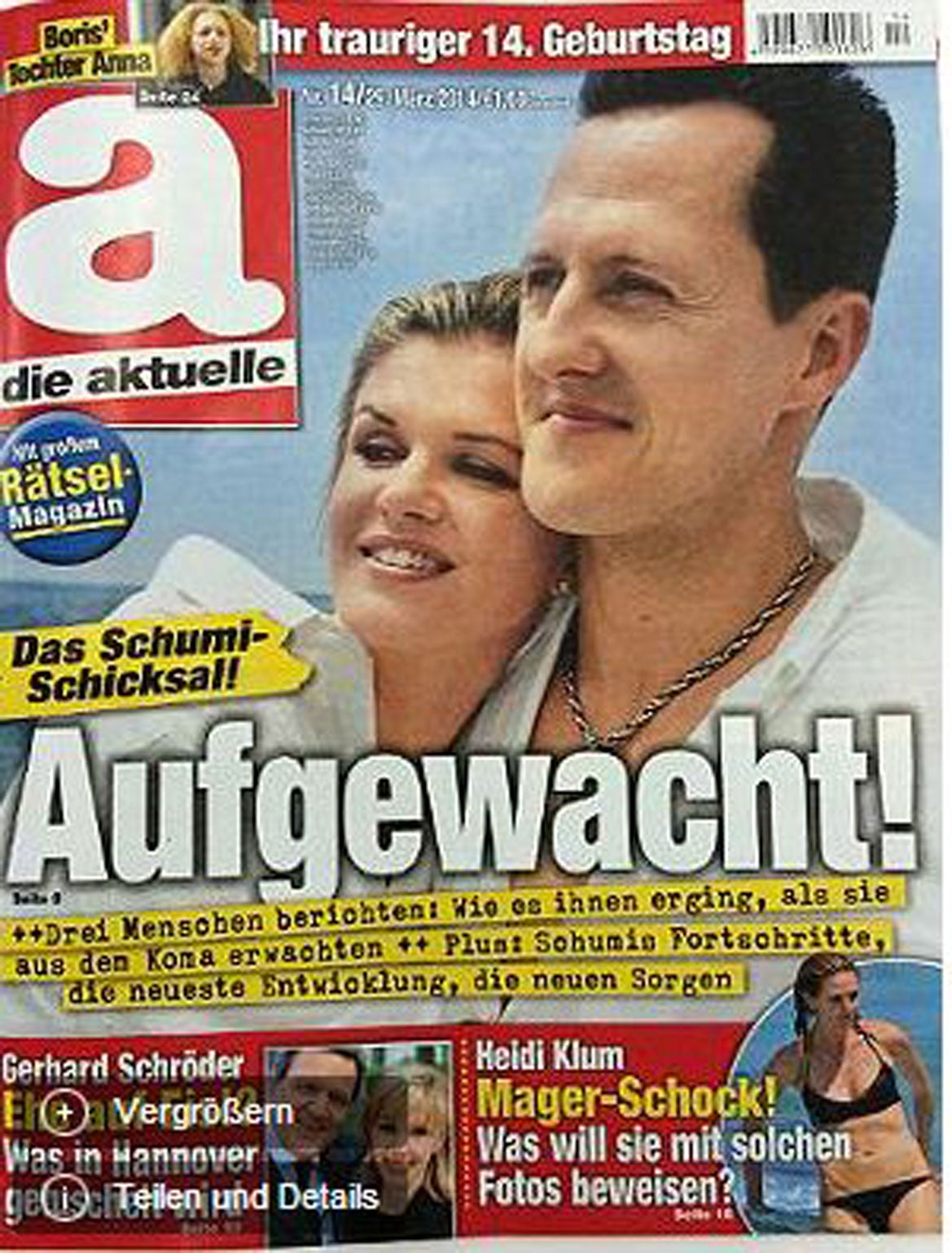Michael Schumacher: Fans complain over German magazine cover that depicts smiling star and wife with 'AWAKE!' headline
The issue was actually nothing to do with the driver, but about other people who have woken up from comas

Your support helps us to tell the story
From reproductive rights to climate change to Big Tech, The Independent is on the ground when the story is developing. Whether it's investigating the financials of Elon Musk's pro-Trump PAC or producing our latest documentary, 'The A Word', which shines a light on the American women fighting for reproductive rights, we know how important it is to parse out the facts from the messaging.
At such a critical moment in US history, we need reporters on the ground. Your donation allows us to keep sending journalists to speak to both sides of the story.
The Independent is trusted by Americans across the entire political spectrum. And unlike many other quality news outlets, we choose not to lock Americans out of our reporting and analysis with paywalls. We believe quality journalism should be available to everyone, paid for by those who can afford it.
Your support makes all the difference.Some of the press coverage of Michael Schumacher’s horrific ski accident that has left him in a medically induced coma since December has been questionable at best.
But the front cover of German women's magazine Die Aktuelle takes the inaccurate and ethically dubious reporting surrounding the former Formula One champion’s medical treatment to a whole new low (scroll down to see the image).
Together with the headline ‘Awake!’, the magazine published a picture of the star smiling with his wife Corinna.
However, a quick flick through the issue promptly revealed that the headline bore no relation to Schumacher at all, but instead to a number of stories about different individuals who had woken up after a coma.
Naturally, the issue has sparked criticism from Schumacher fans and foreign media alike.
German news portal News.de questioned whether the publisher, Gong-Verlag, had deliberately attempted to mislead readers in order to cash in on the tragedy, or whether the issue had simply fallen victim to careless subbing.

“The magazine should be sued. It is just terrible. Tasteless,” one fan wrote about the Die Aktuelle cover on Twitter.
“It was just a blatant attempt to sell more copies of their mag through sensational stories,” said another.
Gong-Verlag has so far declined to comment on the backlash.
The issue follows claims made by former Formula 1 chief doctor Dr Gary Hartstein last week that fans should prepare themselves “for the worst” news as attempts to awaken Schumacher continue.
Schumacher suffered serious brain injuries after hitting his head on a rock when skiing off-piste in the exclusive French resort of Meribel at the end of December.
The 45-year-old’s manager Sabine Kehm confirmed early in March that attempts to awaken the seven-time world champion are continuing and will do for “as long as it takes”, warning that it can be a very long and drawn out process.
However, Dr Hartstein – who was a key figure in the paddock until the end of the 2012 season – has admitted that the longer it takes, the less likely it is that Schumacher will ever recover.
Writing on his personal blog, the American said: “As time goes on it becomes less and less likely that Michael will emerge to any significant extent.”
Dr Hartstein went on to describe Schumacher’s current state as a “persistent coma”, and mentioned the “severe ramifications” that a lengthy period of time in a coma can cause.
“As mentioned previously, the longer one remains in a vegetative state, the less the likelihood of emerging, and the higher the chances of severe ramifications if the patient does in fact emerge,” Dr Hartstein wrote.
“Most definitions consider the vegetative state to be permanent one year after the injury.
“Patients who are in a persistent/permanent vegetative state have lifespans that are measured in months to a few years. This depends on baseline function (extraordinary in the case of Michael, of course), the quality of nursing care, and other imponderables. They usually die of respiratory or urinary infections. Longer survivals have been described, but are exceptional.”
Join our commenting forum
Join thought-provoking conversations, follow other Independent readers and see their replies
Comments